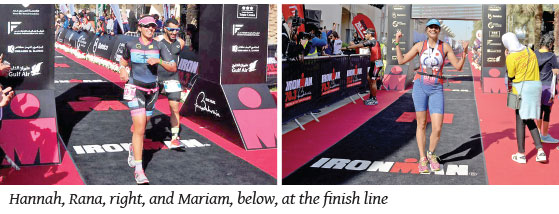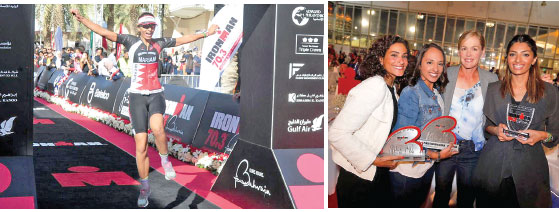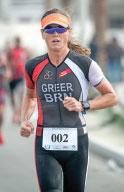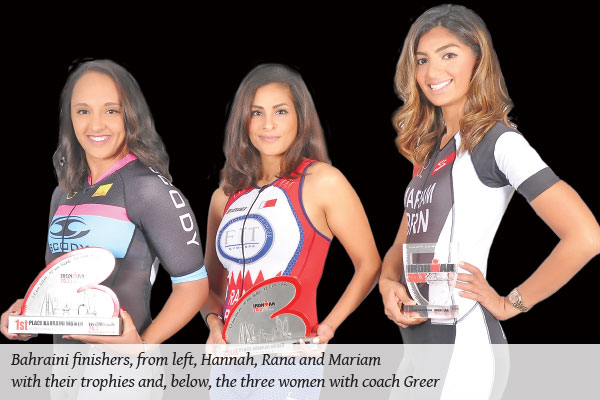What makes someone want to travel 70-plus miles under their own steam? Liz O’Reilly met the Bahraini stars of the most recent Ironman 70.3 who will be representing their country at the coming world championships in Chattanooga, Tennessee, in September.
Hannah Al Khalifa, 26, was the first Bahraini woman past the post. Born to a Bahraini father and a Scottish mother, she was living in London and moved to the island in September 2015, which is when she took up competition seriously. A freelancer in architectural design, she says: “I’ve always been very sporty and just decided to give it a go. I was the fifth Bahraini woman to finish last year; this year I was first!”
Rana Al Alawi, 24, is the baby of the bunch and was the second Bahraini woman finisher. A lawyer working with Batelco, this was her first Ironman. She says: “I was never sporty at school; in fact I broke my hand playing volleyball. But I always felt happy when I was running.” Her first proper race was the November 2015 Cross Island and she got her triathlon bike for her birthday in April 2016.
Mariam Turki, 32, took part in last year’s event but only did the cycling leg. The mum of two, who works in banking, says: “I was crying on the bike and didn’t think I would make it, but I did. Afterwards I thought ‘That’s not enough, I want to do the whole thing now!’” She started training in March last year and also got her bike for her birthday. Mariam was the fourth Bahraini woman to complete the race.
So what is Ironman? It’s a multi-discipline race in which competitors, or teams, swim 1.9km, cycle 90km and run 21.1km; the overall distance is 70.3 miles – a half Ironman. As a way of promoting the sport, HH Shaikh Nasser bin Hamad Al Khalifa, himself a keen triathlete and Ironman competitor, announced that he would pay for the first five Bahraini men and first five women to attend the world championships.

But really, this sounds HARD! Why would anyone want to put themself through months of brutal training and seriously taxing competition?
Rana explains: “I heard about it through Sarah Al-Thawadi [in fact they all did]; she was second last year but was injured and couldn’t compete this year. She told me about the benefits of Ironman training. You might think of it as a commitment, but it’s a lifestyle. It gives you more discipline and not just in your training but in all areas of your life, for example at work. And it’s sociable; you can train with a group or by yourself; the community is very supportive.”

Mariam adds: “After I gave birth to my second child, I was desperate to lose weight. My uncle has a running group called the Happy Team and I asked if I could join them; that’s when I heard about triathlon. I decided, if I was going to do it I wanted to train properly so I contacted Greer [Sansom], who trains us all and then I met these girls, who make training fun.”
“When we first rode together, I couldn’t keep up, all I could see was Mariam looking behind her to see where I was,” says Rana.
“I couldn’t even keep up with the warm-up!” confesses Hannah.
Yet, they all went on to not only complete the race but to triumph. But what of the challenges along the way?
Mariam says: “People think they can’t do it, but it’s very doable. I must admit, I found it a bit difficult at first, because of our culture, to wear the tri suit – it’s like a swimsuit with legs. But there was a lot of encouragement, from my uncles and others, and now I don’t feel uncomfortable at all.
“Another thing to say is that, for triathlon, you have to have a strong mind.”
Hannah agrees, adding: “Absolutely, it is all mental.”
Mariam continues: “One of the main challenges is the cycling because drivers here don’t think you should be on the road.”
“There have been so many times I wished I had a paintball gun on the front of my bike,” says Hannah. “There’s also a lack of good places to swim in open water. You need a lifeguard; I’m always worried about getting cramp and getting washed out.”
“There’s also dirt and weird stuff in the water!” continues Rana.
But all three women are obviously in love with their sport and quick to pay tribute to HH Shaikh Nasser who has opened a 10km cycle loop at his stables to give riders a safe place to train.
And, after a few weeks’ break following the December competition, they are very much back in training and looking forward to Tennessee.
Hannah says: “It’s only for those who have previously qualified and there will be a march of nations, so we’ll be flying the flag for Bahrain. It’s very exciting and the Ironman guys love us. I think it’s because they love Bahrain as they know the people here love the sport.”
In the meantime, though, Mariam is, so far, the only GCC female registered to participate in the Dubai Ironman 70.3. She just can’t get enough!
And all three are keen for others to get involved in the sport. Rana says: “I would really like to encourage everyone to take part especially Bahraini girls. We want to have healthy competition.”
“It’s a great community,” adds Hannah. “Everyone is really helpful to each other. If someone is struggling at the start of a race, you hand over your energy gel to help them get through.”
A Word From the Coach
 All three iron ladies credit trainer Greer Sansom with their success. The native Australian says: “I arrived in Bahrain to work in my profession as a graphic designer but the triathlon coaching is consuming more and more of my day. I see great potential to get more people training properly – it’s just a matter of tapping into the resources that we already have here and opening them up as training venues for the greater community. The athletes that come to me have a great desire to learn about training for long, endurance events. With 15 years of experience in racing and training triathlon, I believe I have a lot to share – that’s how my training group, G Trains Tri, came about.
All three iron ladies credit trainer Greer Sansom with their success. The native Australian says: “I arrived in Bahrain to work in my profession as a graphic designer but the triathlon coaching is consuming more and more of my day. I see great potential to get more people training properly – it’s just a matter of tapping into the resources that we already have here and opening them up as training venues for the greater community. The athletes that come to me have a great desire to learn about training for long, endurance events. With 15 years of experience in racing and training triathlon, I believe I have a lot to share – that’s how my training group, G Trains Tri, came about.
“I’m inspired by the idea of continual improvement and I’m constantly looking for methods to train better and race faster. I had one of my athletes tell me that I was the kind of coach she would tell her daughter about. That meant a lot because identifying elite athletes of the future means getting the kids of today involved. Success in elite sport doesn’t happen overnight – it must be nurtured from childhood. Many of the group that I trained up for the Ironman 70.3 last December were complete beginners – some didn’t even own a bike. Seeing them all cross the finish line beaming with satisfaction was elating for me.
“The hardest part of triathlon is showing up on day one. Women make great endurance athletes and have natural ‘staying’ ability. Triathlon is a wonderful lifestyle choice as swimming, cycling and running are skills that can enhance a holiday, promote lifelong health and provide time out of your busy life to be at one with your thoughts. My hope is that Bahrain will continue to embrace the sport and provide opportunities for the broader community at grassroots level. If we get many people involved and they stay in the sport long enough, the standard will continue to rise.”


































